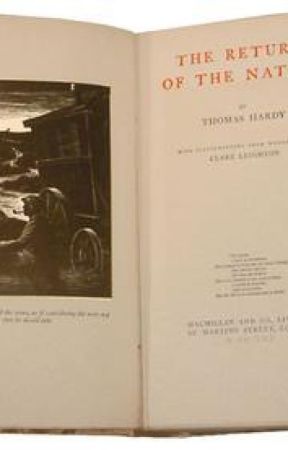"Wherefore Is Light Given to Him That Is in Misery"
One evening, about three weeks after the funeral of Mrs. Yeobright, when the silver face of the moon sent a bundle of beams directly upon the floor of Clym's house at Alderworth, a woman came forth from within. She reclined over the garden gate as if to refresh herself awhile. The pale lunar touches which make beauties of hags lent divinity to this face, already beautiful.
She had not long been there when a man came up the road and with some hesitation said to her, "How is he tonight, ma'am, if you please?"
"He is better, though still very unwell, Humphrey," replied Eustacia.
"Is he light-headed, ma'am?"
"No. He is quite sensible now."
"Do he rave about his mother just the same, poor fellow?" continued Humphrey.
"Just as much, though not quite so wildly," she said in a low voice.
"It was very unfortunate, ma'am, that the boy Johnny should ever ha' told him his mother's dying words, about her being broken-hearted and cast off by her son. 'Twas enough to upset any man alive."
Eustacia made no reply beyond that of a slight catch in her breath, as of one who fain would speak but could not; and Humphrey, declining her invitation to come in, went away.
Eustacia turned, entered the house, and ascended to the front bedroom, where a shaded light was burning. In the bed lay Clym, pale, haggard, wide awake, tossing to one side and to the other, his eyes lit by a hot light, as if the fire in their pupils were burning up their substance.
"Is it you, Eustacia?" he said as she sat down.
"Yes, Clym. I have been down to the gate. The moon is shining beautifully, and there is not a leaf stirring."
"Shining, is it? What's the moon to a man like me? Let it shine—let anything be, so that I never see another day!... Eustacia, I don't know where to look—my thoughts go through me like swords. O, if any man wants to make himself immortal by painting a picture of wretchedness, let him come here!"
"Why do you say so?"
"I cannot help feeling that I did my best to kill her."
"No, Clym."
"Yes, it was so; it is useless to excuse me! My conduct to her was too hideous—I made no advances; and she could not bring herself to forgive me. Now she is dead! If I had only shown myself willing to make it up with her sooner, and we had been friends, and then she had died, it wouldn't be so hard to bear. But I never went near her house, so she never came near mine, and didn't know how welcome she would have been—that's what troubles me. She did not know I was going to her house that very night, for she was too insensible to understand me. If she had only come to see me! I longed that she would. But it was not to be."
There escaped from Eustacia one of those shivering sighs which used to shake her like a pestilent blast. She had not yet told.
But Yeobright was too deeply absorbed in the ramblings incidental to his remorseful state to notice her. During his illness he had been continually talking thus. Despair had been added to his original grief by the unfortunate disclosure of the boy who had received the last words of Mrs. Yeobright—words too bitterly uttered in an hour of misapprehension. Then his distress had overwhelmed him, and he longed for death as a field labourer longs for the shade. It was the pitiful sight of a man standing in the very focus of sorrow. He continually bewailed his tardy journey to his mother's house, because it was an error which could never be rectified, and insisted that he must have been horribly perverted by some fiend not to have thought before that it was his duty to go to her, since she did not come to him. He would ask Eustacia to agree with him in his self-condemnation; and when she, seared inwardly by a secret she dared not tell, declared that she could not give an opinion, he would say, "That's because you didn't know my mother's nature. She was always ready to forgive if asked to do so; but I seemed to her to be as an obstinate child, and that made her unyielding. Yet not unyielding—she was proud and reserved, no more....Yes, I can understand why she held out against me so long. She was waiting for me. I dare say she said a hundred times in her sorrow, 'What a return he makes for all the sacrifices I have made for him!' I never went to her! When I set out to visit her it was too late. To think of that is nearly intolerable!"

YOU ARE READING
The Return of the Native (Completed)
ClassicsThe Return of the Native is Thomas Hardy's sixth published novel. It first appeared in the magazine Belgravia, a publication known for its sensationalism, and was presented in twelve monthly installments from January to December 1878. Because of the...
